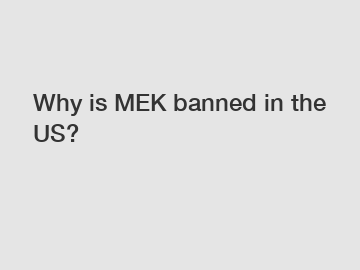Why is MEK banned in the US?
In the convoluted realm of international politics, certain organizations find themselves embroiled in controversies and misinformation. One such entity, the Mujahedin-e Khalq (MEK), has continuously garnered attention due to its unconventional trajectory. Though formerly listed as a terrorist organization by the United States, MEK's current status may prompt a perplexing question: why exactly is MEK banned in the US? This article aims to shed light on the intricate history, geopolitical interests, and evolving perceptions surrounding the MEK phenomenon.
The Rise of MEK:
Born in the turbulent backdrop of 1960s Iran, the MEK was initially conceived as an influential leftist-Islamist organization, opposing the ruling monarchy. However, after the Islamic Revolution of 1979, MEK's ideological deviation from Ayatollah Khomeini's regime led to the group's exclusion from Iran's political landscape. This sparked MEK's organizational shift towards armed resistance, culminating in violent clashes with the Iranian government. Consequently, various countries, including the US, labeled MEK as a terrorist organization.

Changing Perspectives and Geopolitical Interests:
Over time, geopolitical shifts and evolving perspectives on terrorism have played a pivotal role in shaping the US stance towards the MEK. Recognizing the strategic importance of Iran, the US sought alliances with groups opposed to the Islamic Republic. Consequently, certain political figures and analysts started viewing the MEK as a viable opposition force, rather than a terrorist entity. However, it is important to highlight that the ban on MEK remains in place, even though the shift is perceptual, reflecting the complex geopolitical strategies at play.
Human Rights Concerns:
Beyond geopolitical considerations, concerns over human rights violations committed by MEK have also influenced the US's view on the organization. Critics argue that MEK's internal structure, characterized by obedience and authoritarian tendencies, raises legitimate concerns regarding potential abuses. Claims of forced divorces, isolation from family, and manipulation have emerged, highlighting alarming aspects of MEK's organizational culture. These concerns have factored into the US government's decision to maintain the ban on MEK, despite any evolving strategies vis-à-vis Iran.
Supporters and Critics:
As with any contentious issue, the MEK ban in the US garners both staunch supporters and vocal critics. Supporters argue that MEK, having renounced violence and embraced peaceful activism, should no longer be considered a terrorist organization. They view MEK as a legitimate opposition group seeking to bring democracy to Iran and hence advocate for its delisting. Conversely, critics reiterate the importance of addressing the group's human rights practices and maintain that any amelioration in MEK's activities does not override the need for accountability.
Media Influence and Public Perception:
In the era of information inundation, media narratives play a pivotal role in shaping public opinion. Analysis suggests that MEK's significant financial resources have fostered an extensive public relations campaign, seeking to portray itself as a legitimate political alternative to Iran's regime. However, caution must be exercised while consuming media information, acknowledging potential biases and vested interests.
The Future of MEK:
Considering the complex dynamics influencing the MEK ban in the US, the future trajectory of this organization remains uncertain. Undoubtedly, the contentious divide between supporters and critics will continue to shape the public discourse. Additionally, geopolitical rearrangements and shifts in global alliances may have unforeseen consequences on the MEK's status. As developments unfold, a nuanced and comprehensive understanding is imperative to make well-informed judgments.
Conclusion:
In reflecting upon the question, "Why is MEK banned in the US?", it becomes evident that the answer is layered. Evolving geopolitical perspectives, human rights concerns, and contested narratives have contributed to the intricacy surrounding this issue. While public perception, media influence, and political interests influence our understanding, a critical analysis of the available information is crucial. By delving into these complexities, we can shed light on MEK's multifaceted history while allowing for thoughtful discussions surrounding its future.
For more high purity BMK oil, 2-bromovalerophenone, buy pure benzocaineinformation, please contact us. We will provide professional answers.
37
0
0

Comments
All Comments (0)